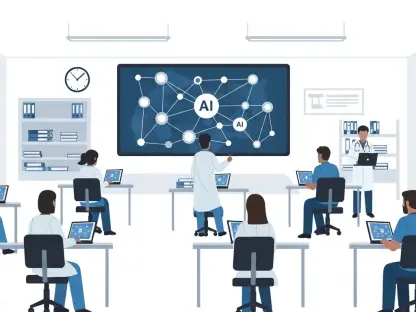Mount Sinai Health System has inaugurated the Hamilton and Amabel James Center for Artificial Intelligence and Human Health at its Icahn School of Medicine, ambitiously aiming to enhance healthcare delivery through cutting-edge AI research, development, and application. This newly established facility embodies Mount Sinai’s commitment to consolidating various AI-driven initiatives under one roof, thus fostering collaboration across multiple programs dedicated to advancing medical diagnostics, treatment options, and the overall understanding of human health. Standing at a sprawling 65,000 square feet within a repurposed building on Mount Sinai’s Manhattan campus, the Center boasts eight floors, designed to host around 40 principal investigators and 250 support staff, including graduate students, postdoctoral fellows, and computer scientists. This grand consolidation effort aims to create an optimal environment for groundbreaking medical discoveries by integrating AI across diverse disciplines such as genomics, imaging, pathology, and electronic health records. According to Dr. Eric Nestler of Mount Sinai, these monumental efforts are expected to revolutionize patient diagnosis and treatment, marking a significant stride in the application of AI in healthcare.
Expanding AI Capabilities in Healthcare
The establishment of the Hamilton and Amabel James Center for Artificial Intelligence and Human Health is a strategic move by Mount Sinai to expand its AI capabilities in healthcare, ensuring that the new Center also becomes the home to the Windreich Department of AI and Human Health. Moreover, it encompasses several other collaborative entities, including the Hasso Plattner Institute for Digital Health, the Institute for Genomic Health and the Division of Medical Genetics, the Biomedical Engineering and Imaging Institute, and the Institute for Personalized Medicine. This approach of co-hosting various departments under a single umbrella aims to enrich collaborative research and drive innovative solutions that address critical healthcare challenges. Current AI projects at Mount Sinai include forging an AI Fabric, aimed at integrating machine learning and AI-driven decision-making throughout Mount Sinai’s eight hospitals, to ensure seamless healthcare services and improved patient outcomes.
Mount Sinai’s ongoing exploration of AI application in healthcare has already seen AI being used in analyzing surgical videos, automating administrative tasks, and providing more accurate diagnostic capabilities. However, not all AI endeavors have proven to be universally viable; for instance, a recent evaluation of large language models (LLMs) for automating medical coding revealed that models from tech giants such as OpenAI, Google, and Meta were not yet suitable for the task. Despite these challenges, the institution remains undeterred, continuously experimenting and refining AI models to better serve patient needs. Mount Sinai plans to integrate AI technology into all healthcare applications within the next three to five years, signifying a crucial technological shift and firmly placing AI at the heart of its operational and clinical strategies.
Leadership and Collaborative Advances
Mount Sinai Health System has launched the Hamilton and Amabel James Center for Artificial Intelligence and Human Health at its Icahn School of Medicine. The facility aims to advance healthcare through AI research, development, and application. This center epitomizes Mount Sinai’s goal to centralize various AI projects, promoting collaboration across different programs dedicated to improving medical diagnostics, treatments, and overall health understanding. Spanning 65,000 square feet in a refurbished building on Mount Sinai’s Manhattan campus, the center features eight floors that will accommodate about 40 principal investigators and 250 support staff, including graduate students, postdoctoral fellows, and computer scientists. This consolidation effort is designed to foster medical breakthroughs by incorporating AI into multiple areas such as genomics, imaging, pathology, and electronic health records. Dr. Eric Nestler of Mount Sinai asserts that these significant efforts are poised to transform patient diagnosis and treatment, marking a substantial advancement in the use of AI in healthcare.









